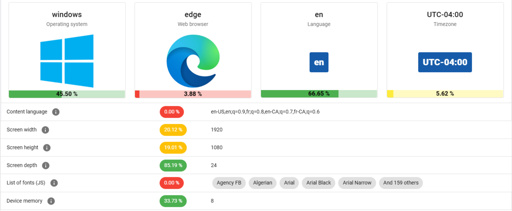Amidst the glossy marketing for VPN services, it can be tempting to believe that the moment you flick on the VPN connection you can browse the internet with full privacy. Unfortunately this is quite far from the truth, as interacting with internet services like websites leaves a significant fingerprint. In a study by [RTINGS.com] this browser fingerprinting was investigated in detail, showing just how easy it is to uniquely identify a visitor across the 83 laptops used in the study.
As summarized in the related video (also embedded below), the start of the study involved the Am I Unique? website which provides you with an overview of your browser fingerprint. With over 4.5 million fingerprints in their database as of writing, even using Edge on Windows 10 marks you as unique, which is telling.



Librewolf + uBlock Origin + Privacy Badger + containerise
For the comedy extra point, a user agent switcher can actively lie about your browser & OS.
Using a browser like Librewolf is, itself a unique identifier bc not enough people are using it.
EFF has a tool that lets you check your “uniqueness” and bc I used a lesser known browser, it was easier to track me.
Not that I mean you shouldn’t use it. I just wanted to clarify that it doesn’t make you safe from ads. :(
https://coveryourtracks.eff.org/ is the EFF tool.
My results say that I have strong protections against tracking, and that my browser is unique. It’s as good as I can get.
The agent switcher also tells the world my Librewolf on Linux is Chrome on Windows.
Thanks for linking it! I should have done that. And if LibreWolf is showing as Chrome on Windows, then you’re good!
Thanks for linking it! I should have done that. And if LibreWolf is showing as Chrome on Windows, then you’re good!